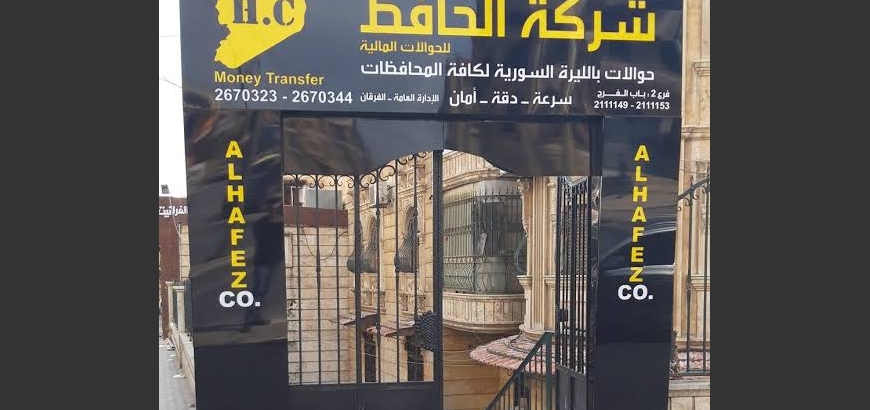The Syrian Central Bank’s Counter-Money Laundering Agency has closed dozens of money transfer companies, most prominently Arak, Ersal, and al-Hafez, sealing some branches in Damascus with red wax.
On its official website, the bank gave the reason for closing the transfer companies by saying it came, “as a result of information and data becoming available indicating that these branches were involved in carrying out foreign transfers they were not licensed to carry out, from an unknown source and in a manner that violates the laws and regulations in effect and involves risks of money laundering and terrorist financing.”
It said that the companies had been transferred to the relevant courts for the investigation.
The Central Bank called on citizens to report financial transfers that have reached them from outside Syria through the specified companies and asked them to, “report receiving any foreign transfers by way of internal transfer companies.”
A report published by the Sowt al-Asima network a few days ago said that the closing of the exchange companies coincided with State Security branches summoning hundreds of people for “routine” investigations about internal transfers they recently received.
The Al-Modon newspaper also quoted an unnamed security source on Dec. 20, 2019, as saying that the recent measures by the Central Bank came as direct orders from the State Security Directorate in Damascus in order to clamp down on these companies, which it said had, “in recent months, taken part in smuggling millions of dollars outside Syria” and thereby contributed to a “blow to the exchange rate and decline of the Syrian pound.”
The instructions issued by State Security, according to the security source, included collecting the data of these companies and some licensed exchange shops and carrying out operations such as intensified monitoring of phone calls, monitoring banking accounts of the companies and some connected individuals, and monitoring the movements of influential figures in these companies through border crossings as well as any transfer operations that occur during the campaign.
Will the decision affect the exchange rate?
The decline in the value of the Syrian pound against the dollar is still ongoing, with the most recent fall of about 20 pounds, compared with the price before the close of the Thursday session, occurring at the end of last week on the Damascus Securities Exchange.
On Monday its value reached 912 pounds selling and 905 pounds buying against the US dollar.
Economic expert Firas Shaabou believes that, “the security branches are responsible for closing the transfer companies … the aim is not to control the exchange rate but rather security purposes.” He said that the measures to close the companies would not affect the exchange rate, especially given that this operation was preceded by other operations which had limited effect.
This article was translated and edited by The Syrian Observer. The Syrian Observer has not verified the content of this story. Responsibility for the information and views set out in this article lies entirely with the author.


